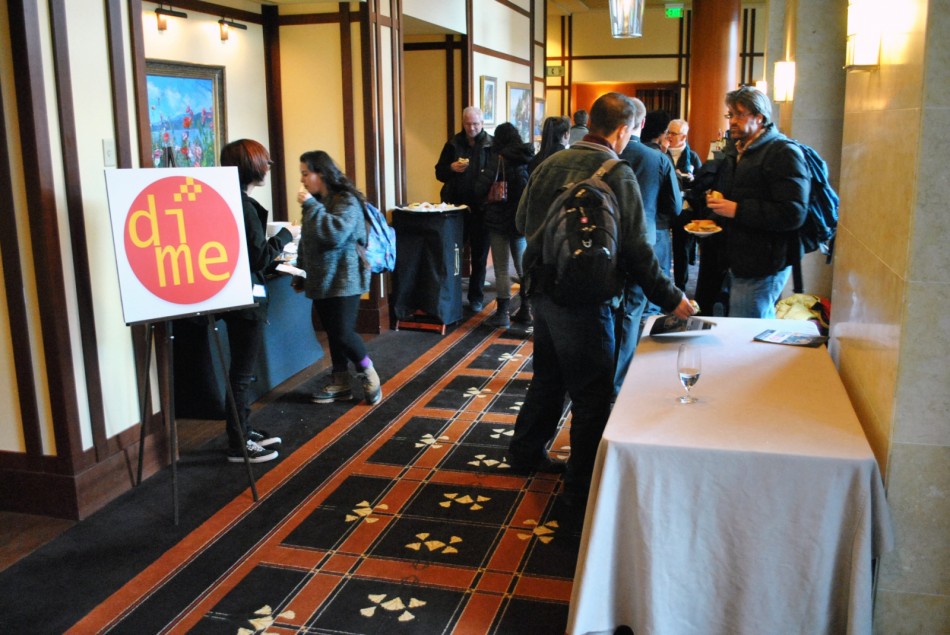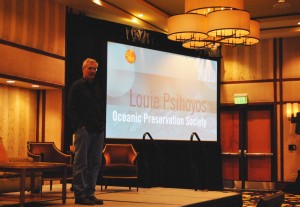
Boulder’s DiMe Taps Entrepreneurs and Environmentos
The St. Julien Hotel ballroom in Boulder was bustling February 15th with an all-star cast of start-up entrepreneurs, filmmakers, and media visionaries, who gathered to speak to a crowd of tech-heads, young and old, paying $65 to attend Boulder Film Festival’s fourth annual Digital Media Symposium. With keynote speakers Blaise Aguera y Arcas of Microsoft and Louie Psihoyos, Oscar-winning director of “The Cove”, the crowd got an afternoon’s worth of sneak-peeks at an as-yet unreleased film, Psihoyos’s The Singing Planet, and of object lessons on how a Microsoft exec started life as a hacker.
Silicon Flatirons entrepreneurship initiative director Brad Bernthal explained the meaning behind the symposium -“to learn from people already in the craft.”
The event started in digital media fashion with moderator Dave Taylor urging the crowd to live-tweet the event. Taylor tweeted a quote by Preston Padden during his presentation, “Old Media, New Tricks.”
3D space — and knowing the world
 Blaise Aguera y Arcas delved into his love of video games, explaining how he and his friends would hack the intro to German game .kkrieger to compete for better graphics. This drive to want to improve the spatial components of the game later flowed into his work for Microsoft, he said.
Blaise Aguera y Arcas delved into his love of video games, explaining how he and his friends would hack the intro to German game .kkrieger to compete for better graphics. This drive to want to improve the spatial components of the game later flowed into his work for Microsoft, he said.
Aguera y Arcas shared his work on Bing Maps, where he experimented with Flickr photos tagged in Seattle to create a real-life rendition of a city street. His example showed the ability to peruse a map for a better understanding to “know the world.”
He then moved to his creation Photosynth, where he used multiple pictures to get a “spatial relationship” of a subject to “reconstruct semantics from the media to extract meaning.” This 3D rendition was so intricate that it even depicted tattoos on, yes, an actual human body in 3D space. (He had given a similar demonstration at his 2010 TED talk.)
Technology in video
 The screen took the lead during the afternoon with presentations revolving around production, animation and infrared cameras built to see carbon emissions.
The screen took the lead during the afternoon with presentations revolving around production, animation and infrared cameras built to see carbon emissions.
Jeff Chow showed off his video-editing app CTRL+Console, which lets users forget program keyboard shortcuts and allows them the ability to quickly edit using gestures on an iPad or iPhone.
The application connects devices wirelessly and makes editing look easy with the ability to chop clips, joggle through footage, and perform other tasks with your fingertips.
Chow played a clip of Steve Jobs as he showed the limitations of smart-phone keyboards, and explained that video editing on keyboards is also limited. Chow stressed that keyboards were made to write, and a mouse was meant to navigate, and CTRL+Console was made to edit. The application is to be released to the public in April.
Adrian Bishop of Bloom Animation started his presentation with a bit of word play. Bishop said he thinks the phrase “digital media” should be fully encapsulated into its root word “media” because most content in this age is digital from its creation and stays that way for its entire life. He backed his argument by referring to movie theaters converting all film to a digital format. “It’s almost impossible to view media without the digital aspect.”
His animated U.S. Army training game Searcher 360 showed how media is changing the way we train armed forces. The game allows real life scenarios to be played out within a 3D game, allowing for hands-on training within a controlled environment. Likewise, his Medamorphis Medical training app allows med students to perform surgical operations from a screen without running the risk of harming a real person.
Erika Trautman said she may be the only presenter who is a “non-coding founder,” but her product doesn’t make that statement apparent. Trautman showed the capabilities of her interactive video editing software Flixmaster, which allows editors to string together clips of video so viewers can “choose their own adventure.”
The drive behind her project is the viewer’s inability to watch full videos. With Flixmaster, users have the ability to interact with the media, giving them the control to choose what comes next. The software allows producers to view analytics of the video, showing when the user tuned in, or dropped out. Flixmaster also interacts with the page it’s located on, changing background colors to add to the mood of each clip.
“Polite as Usual”
 University of Colorado School of Law professor Preston Padden elicited laughter from the crowd as he talked about film piracy. According to Padden, more than a half million stolen movies are downloaded a day, but he urges the film industry to learn from the mistakes that plagued the record industry — “Don’t sue your customers.” He explained DreamWorks attempt to remove its films from popular torrent site The Pirate Bay, which brought an unforgettable reply from the Swedish site:
University of Colorado School of Law professor Preston Padden elicited laughter from the crowd as he talked about film piracy. According to Padden, more than a half million stolen movies are downloaded a day, but he urges the film industry to learn from the mistakes that plagued the record industry — “Don’t sue your customers.” He explained DreamWorks attempt to remove its films from popular torrent site The Pirate Bay, which brought an unforgettable reply from the Swedish site:
As you may or may not be aware, Sweden is not a state in the United States of America. Sweden is a country in northern Europe. Unless you figured it out by now, US law does not apply here. For your information, no Swedish law is being violated.
Please be assured that any further contact with us, regardless of medium, will result in
a) a suit being filed for harassment
b) a formal complaint lodged with the bar of your legal counsel, for sending frivolous legal threats.
It is the opinion of us and our lawyers that you are ……. morons, and that you should please go s—-ze yourself with retractable batons.
Please also note that your e-mail and letter will be published in full on http://www.thepiratebay.org.
He described ways to combat the illegal downloading of films, like the ability to “buy once, play anywhere,” where customers may view purchased films from any device using a cloud-like format.
Keep listening
 Louie Psihoyos wrapped up the film topic when he took the stage. He explained the success of his last film “The Cove,” not just in critical acclaim, but in the protection of the dolphins the documentary was based upon (two-thirds fewer of the mammals are unharmed, since its release).
Louie Psihoyos wrapped up the film topic when he took the stage. He explained the success of his last film “The Cove,” not just in critical acclaim, but in the protection of the dolphins the documentary was based upon (two-thirds fewer of the mammals are unharmed, since its release).
The response to the film was remarkable, especially since Psihoyos was new to the film world (it being his first film). Though he obtained some not-so-helpful knowledge from Steven Spielberg-“Never make a movie about boats or animals”- he plans to make yet another, and hopes to shed light to creatures we haven’t been listening to.
The crowd was amazed by unseen footage from Psihoyo’s work in progress “The Singing Planet,” which focuses on the animals whose voices have seldom been heard. The previewed shots depicted Psihoyos listening to extinct birds, enormous animated depictions of species on multiple city facades, and footage of carbon emission in everyday life taken by reworking an infrared camera to see the harmful gas as it is produced.
 As Psihoyos exited the stage he left the crowd with one last recommendation to save the ocean-“eat a plant based diet”- a perfect note to end on in a city known for its environmental friendliness.
As Psihoyos exited the stage he left the crowd with one last recommendation to save the ocean-“eat a plant based diet”- a perfect note to end on in a city known for its environmental friendliness.
